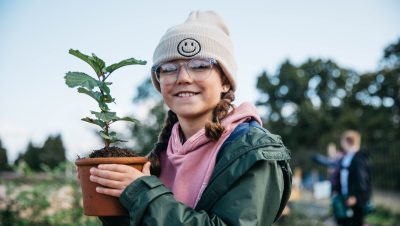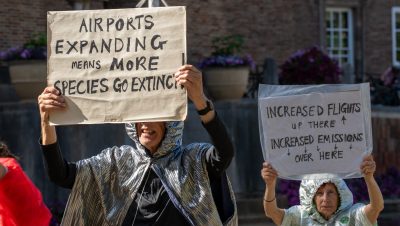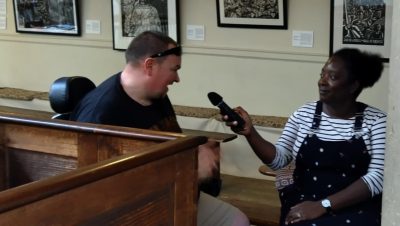News / Nature
Nature Rising film celebrates Global Majority leadership in Bristol
An event at Junction 3 library in Baptist Mills last week hosted a screening of a short film documenting a community event run by Elsie Harp and Tara Miran at St Paul’s Community Garden.
“The film focuses on the underlying reasons for Nature Rising and its success,” said Gnisha Bevan, co-founder of Black Seeds Environmental Social Justice Network and Nature Rising.
Built in partnership with the Black Seeds Network and Friends of the Earth and funded by WECA, Nature Rising is a one-of-a-kind climate project that is designed and led by Global Majority communities in Bristol.
is needed now More than ever
“Nature Rising stands on challenging the deficit mentality around Global Majority communities and moves towards asset-focused thinking,” remarked Gnisha Bevan, speaking to Bristol 24/7.

Gardener Elsie Harp was part of the Nature Rising project and helps to tell the story of the project in the film – photo: Mae Ghosh
One of the most important things Nature Rising strives to do is create a space where environmental practices from all across the world, culture and heritage are nurtured and put to use.
“There’s a belief in the mainstream environment sector that environmental practices from outside the UK aren’t relevant here. We are actively opposing that, and we’re working with cross-cultural and international knowledge,” Gnisha added.
Nature Rising’s short film, directed by Michelle Pascal and Tracy Miller, hinges on this very belief.
“One of our team members, Elsie Harp, who is a herbalist, ran a workshop with refugees and asylum seekers on herbs that are good for people and for nature.
“It was rooted in the belief that if we look after nature, nature looks after us. She knew that asylum seekers get moved around a lot within the UK; hence, if they do a manual gardening project, they might not get to see the literal fruits of their labour,” said Gnisha, elaborating on how Nature Rising acknowledges and builds on the expertise of Global Majority communities.
“Hence, Elsie focused on skills and looked into different herbs which are good for both people and for pollinators. She was curious to understand how these herbs can be used and what is already known about them.”

A workshop after the screening at Junction 3 collected participants’ ideas of the valuable insights they’d gained from the film and the work of Nature Rising – photo: Mae Ghosh
The documentary illustrates how different cultures are more interconnected than not.
It sheds light on an Elder tree that stands in St Paul’s Community Garden and bears significance across many cultures.
It grows in the UK, Europe, and parts of Syria and embodies Celtic mythologies surrounding it. Each community has different uses for the tree and different stories about it.
“The tree became quite symbolic to our project,” said Gnisha, addressing the audience after the film screening.
The workshop following the screening was a stimulating gathering of opinions on what good practice the audience took away from the film.
One group shared: “representation in leadership, cross-generational focus, and focus on herbalism.” Another group, echoing these points, appreciated the focus on awareness of funding and reciprocity of feeling between both nature and human beings.

The project brought together community members of different backgrounds for green skills and plant workshops in St Paul’s – photo: Nature Rising
The film did not shy away from the importance of funding for projects like this. The audience also resonated with the film’s strength-based narrative around climate issues by Global Majority communities.
“I’d love to see recognition of the emotional labour involved in works like this. People with lived experiences are asked to undertake lots of knowledge-sharing, which can lead them to relive their trauma, and there needs to be compensation for that,” Gnisha said.
“We can’t keep asking Global Majority people to work for low pay. After the murder of George Floyd and the Black Lives Matter protests, there was such a surge in interest in having more inclusive environmental work.
“Five years later, I see that a lot of Global Majority leaders who were so inspired by the potential are exhausted by the slowness of the progress. With this exhaustion, we risk losing their talent and skills, which are irreplaceable.
“I’d like to see some flexible funding so that Global Majority leaders can be engaged effectively and they’re well paid.”

Gnisha Bevan, who founded the project, says more funding is needed for work like this, in order to close a widening gap of inequality – photo: Nature Rising
Bristol 24/7 caught up with Mary, an intern at the Black Seed Network, after the screening.
“This is my first event with Nature Rising, and it further fuelled my passion for the environment,” said Mary, an international student from Kenya studying for a Master’s in Environmental Management at UWE.
“My passion for the environment comes from my work with communities and schools back home in Kenya, and I’m excited for it to find a place in Bristol.”
Gnisha hopes to keep changing the narrative around nature through Nature Rising:
“The mainstream isn’t looking at relationships between people and the historical legacies like colonialism and enslavement, which are still playing out today. So, if we don’t include those narratives, we’re going to be at serious risk of widening inequality.”
When asked what gives hope to her work, Gnisha remarked: “The people I work with and the possibility to keep on doing this.”
Nature Rising has an ongoing exhibition at We The Curious until Sunday, June 1.
This piece was produced by Mae Ghosh as part of Bristol24/7’s Youth Climate Reporter scheme which seeks to amplify underrepresented voices and broaden the range of perspectives and stories we tell on environment issues. The scheme is funded by Bristol City Council and our Better Business members.
Main image: Nature Rising
Read next:
 Our newsletters emailed directly to you
Our newsletters emailed directly to you




















